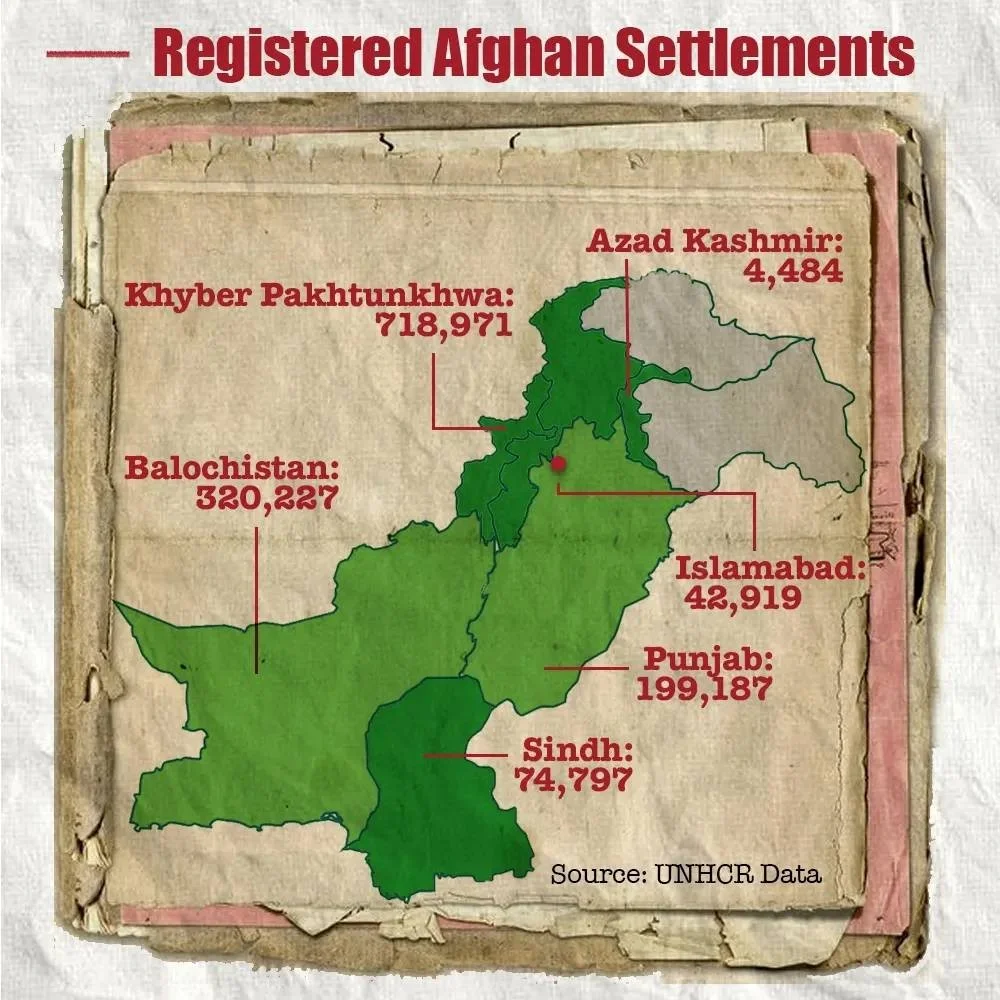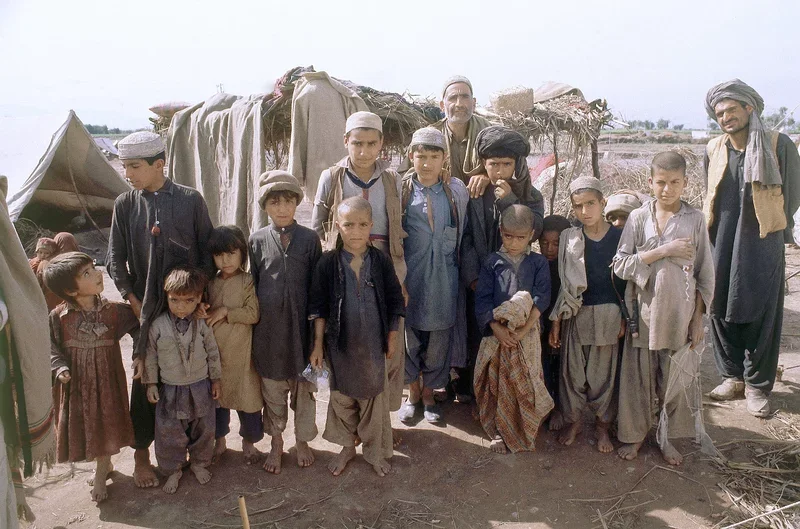For over 4 decades, Pakistan has quietly shouldered one of the largest refugee crises in modern history. From the 1970s to 2024, millions have sought refuge here—fleeing wars, poverty, and persecution. But how has Pakistan managed to handle such overwhelming numbers of Afghan refugees?
![Overview of top 10 countries hosting the most Afghan refugees [PAYF Informatics]](https://pkafgyouthforum.com/wp-content/uploads/2024/10/GYusnGrWoAE4e5d.webp)
1979-1989: The Soviet-Afghan War
During the Soviet invasion, over 3 million Afghan refugees crossed into Pakistan, the largest refugee influx the region had ever seen. Pakistan, despite its economic limitations, spent around $1 billion on camps, education, and healthcare. UNHCR and the US were key supporters, but it was still a monumental task for a developing country.
![A convoy of Soviet tanks wave to crowds after their arrival in Kabul from the eastern city of Jalalabad as part of the Soviet withdrawal from Afghanistan, May 1988. [Reuters]](https://pkafgyouthforum.com/wp-content/uploads/2024/10/GYut5a0XgAAkowa.webp)
1980s: Mujahideen Resistance & More Refugees
As the Soviet-Afghan conflict dragged on, more Afghans fled the war. By 1985, the Afghan refugee population in Pakistan swelled to 3.5 million. The Pakistani government allocated hundreds of millions annually for camps and services, but many refugees moved into urban areas. The World Food Programme (WFP) and International Red Cross also contributed, yet resources were stretched thin.
1990s: Civil War & The Taliban’s Rise
After the Soviets left, Afghanistan’s civil war caused further displacement. By 1995, Pakistan hosted nearly 4 million Afghan refugees. Many moved into cities like Peshawar and Quetta. The government’s expenditures were climbing—up to $2.5 billion over the decade— as UNHCR pushed for voluntary repatriation, which saw limited success due to the Taliban’s rise.
![A Taliban rally in Kabul in 1996. [Getty Images]](https://pkafgyouthforum.com/wp-content/uploads/2024/10/GYuuEXdWkAEeVkB.webp)
2001-2010: The 9/11 Aftermath & Global War on Terror
The U.S. invasion of Afghanistan in 2001 saw another wave of refugees. Pakistan, now hosting over 3 million refugees again, faced mounting security concerns and higher costs. The Pakistani government spent an additional $3 billion from 2001 to 2010 on refugee care, alongside receiving aid from international bodies like the European Union and World Bank. However, rising militancy and the impact on local economies made the situation dire.
![Pakistan's sacrifices against terrorism [PAYF Informatics]](https://pkafgyouthforum.com/wp-content/uploads/2024/10/GYuuyYcWoAAdHWR-scaled.webp)
2010s: Economic Migrants, Rohingya Crisis, & Urbanization
Although Afghan repatriation was promoted by UNHCR, around 2.7 million Afghans remained in Pakistan by 2015, refusing to return due to instability in Afghanistan. Economic migrants from Bangladesh and Myanmar’s Rohingya refugees added to the strain. Pakistan spent an estimated $500 million annually on these populations, while migration into urban centers intensified, blurring the lines between refugees and local populations.
![Afghan families arrive from Pakistan with their belongings to Spin Boldak border crossing, in Kandahar province. [UNHCR]](https://pkafgyouthforum.com/wp-content/uploads/2024/10/GYuvSu3WkAAG1XV.webp)
2021: Taliban’s Return to Power & A New Wave of Refugees
The Taliban’s takeover in 2021 triggered yet another mass exodus from Afghanistan. By 2022, Pakistan hosted 1.4 million registered Afghan refugees and an estimated 600,000 unregistered ones. Over $1 billion was allocated by Pakistan in 2021-2022 alone to deal with this new influx, with support from UNHCR and international NGOs. Yet, the economic burden was heavier than ever before, with inflation and rising unemployment further complicating Pakistan’s ability to assist.
![Afghans in Pakistan [PAYF Informatics]](https://pkafgyouthforum.com/wp-content/uploads/2024/10/GYuvYVaX0AA-Gg7.webp)
2023: Repatriation of Illegal Immigrants by Pakistan
With the economy under stress and rising security concerns, Pakistan launched a crackdown on illegal immigrants, deporting over 200,000 undocumented Afghans and other migrants. While Pakistan spent an estimated $400 million managing this campaign, it called for greater international support, particularly from neighboring countries and organizations like the UN, to alleviate the pressure. The cost of accommodating refugees, which has totaled over $10 billion since the 1980s, has led to renewed calls for more equitable global burden-sharing.
![Afghan refugees gather around National Database and Registration Authority (Nadra) vans for biometric verifications as they prepare to depart for Afghanistan, at a holding centre in Landi Kotal on Nov 1. [AFP]](https://pkafgyouthforum.com/wp-content/uploads/2024/10/GYuv1cZXwAA6fzn.webp)
The Numbers Today
As of 2024, Pakistan still hosts more than 1.4 million registered Afghan refugees, alongside nearly 1 million unregistered individuals. Total expenditure on refugee management has surpassed $11 billion over four decades, with very limited international financial assistance.
UNHCR, USAID, and the EU have contributed, but much of the cost has been borne by Pakistan alone, raising questions about how long it can continue to manage these populations without significant global support.
Despite the staggering costs and ongoing challenges, Pakistan remains at the forefront of one of the world’s longest-running refugee crises. With a 40-year history of accommodating millions, Pakistan’s resilience is a testament to its humanitarian commitment, but the strain is undeniable. Will the world step up to share the burden?

PAYF Insights are social media threads by various authors, reproduced here for wider consumption.



